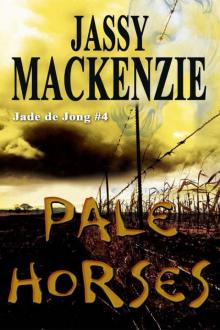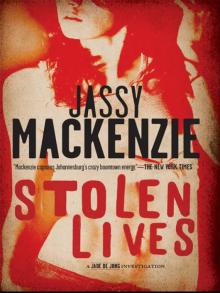- Home
- Jassy Mackenzie
Bad Seeds Page 2
Bad Seeds Read online
Page 2
“It’s a murder. It looks bad. You need to get here fast.”
“I’m on my way,” she said.
It was turning into a bad week for murders. Last Tuesday, one of the construction workers from the new industrial complex had sidled into the police station and muttered something about taking a shortcut home and seeing somebody dumping a body at night, up near the Robinson Dam. After questioning him, Mweli had decided that there was sufficient proof to get a dredging operation authorized. She’d just been finalizing the logistics of this with the dredging company and coroner. But already there was another serious crisis to attend to.
She grabbed her car keys, hitched up the belt of her too-tight pants, ran a hand over her short, curly hair and strode purposefully to the door.
Five minutes later, siren blaring, she was on her way to the Best Western motel. Traffic was terrible. None of the lights were working, thanks to the power cuts, and even with the siren it was difficult to make headway through the gridlock.
Eventually she reached the place. The motel’s neon sign flickered into life as she pulled into the parking lot. It was five past seven, and power had just been restored to this part of the city.
A small crowd of onlookers was gathered outside one of the rooms. The crime scene, presumably. Checking her rearview mirror, she saw her junior detective Phiri arriving in his beige unmarked car.
Puffing from the exertion, Mweli marched toward the motel room. Phiri followed, carrying the large bag with the equipment, cameras and protective footwear. The forensics van, thankfully, was already there.
Mweli gave a puzzled glance at the silver SUV that had collided with the motel’s signpost. Was this related to the crime? Drugs, alcohol—had they contributed to the crash? Had the perpetrator been attempting to escape?
She was distracted by the manager hurrying over to meet her, her face drawn with anxiety.
“Has anybody been inside?” Mweli asked. “Who discovered this?”
“That lady over there in the beige top. She said she opened the door and saw the bodies, but didn’t go in.”
Bodies? A multiple murder?
Mweli turned to the slender, brown-haired woman standing near the door. She was wearing a body-hugging beige shirt under a black jacket and a pair of black cargo pants.
“Wait here, please, ma’am. I must interview you,” Mweli told her.
The woman tightened her lips, as if she was going to argue that she couldn’t wait. But then she simply said, “Okay.” Her voice was calm, like her eyes. Too calm for a civilian who’d just stumbled upon a grisly murder scene? Mweli would need to look into that.
A camera flash blinded her. Already the press was here, if only the journalist from the local gazette. How did they always know?
“No photos, please, not yet,” Mweli said in an authoritative tone, holding up a palm in his direction. “Move away from the door, people. We need room to work. Phiri, if you could tape off the area—yes, from that pole there. Give us some space.”
She stretched a pair of gloves over her hands and, with some difficulty, bent down and eased on a pair of foot covers.
Then she pushed the door open and switched on the light. The bulb flickered into life, and Mweli’s eyes narrowed. The floor was a scarlet lake. She could smell the coppery taint of the blood. And in the center of the lake lay two bodies.
This wasn’t just blood.
Over the swish of tires and the babble of voices outside, the sound of running water was audible.
“Crap,” Mweli muttered. She bent again and rolled her trouser legs up a few turns, exposing the faded pink socks she wore beneath.
Taking a deep breath, she splashed her way carefully over the flooded floor, stepping around the bodies of the man and the woman and noticing as she did so the bloodied baseball bat that lay on the bed.
She took another step, and her foot skidded forward. Her arms pinwheeled as her toe made abrupt, painful contact with the side of the bed, sending a splash of reddened water onto the off-white sheets. Breathing hard, she grabbed the edge of the bedside table for support. The floor was as slippery, as if it had been greased. In fact, she could smell the thick aroma of oil over the stink of blood.
The foot covers were unnecessary; this scene was contaminated beyond any hope of salvaging.
Treading more warily, determined not to slip and fall into this oily, bloody mess, she maneuvered into the bathroom. The smell of the oil was stronger here. The bath was overflowing as the tap released a deluge of lukewarm water into the tub.
Swearing under her breath, Mweli leaned over and turned it off.
Chapter Four
The cool night air smelled fresh after the stink of the bloodied motel room. With her back against the building’s brick wall, Jade waited as Warrant Officer Mweli jotted down her name and occupation in her notebook.
“Yes,” Jade responded. “The driver of the silver Toyota Land Cruiser was the same woman I saw dead in the motel room.”
“Had you seen her before?”
“Only after the collision. She had a bloody nose. I gave her tissues, but she didn’t want any further help.”
“Did you notice anything in the vehicle?”
“There was a black leather purse on the passenger seat.”
Now that Jade recalled the purse, she realized she hadn’t seen it in the motel room. Where had it gone?
A pause as Mweli scribbled down her statement. Then she asked, “Can you please, in your own words, tell me exactly what occurred from the time you arrived at the Best Western Randfontein?”
At that moment, Jade heard the growl of the Porsche’s engine. Glancing to her right, she saw its white bonnet appear around the building. Botha was going out. So soon after he’d checked in? She couldn’t follow him now, but it would give her the chance she needed to get into his room.
Per Mweli’s request, Jade described the accident. “The silver Toyota SUV left the parking spot outside room number twelve and sped toward the exit. It was raining heavily, and the car collided with that signpost.”
As she was describing the bloodied air bag to the detective, she glanced toward the gate and saw that the Porsche hadn’t yet left. Botha had stopped. His window was rolled down, and he was staring across the forecourt at the blue flashing lights of the police cars, the crime scene tape, the crowd of curious onlookers.
Watching Jade as she spoke to the overweight detective.
“Coming out of the lobby later, I saw that the SUV’s door was still open,” Jade continued, turning her back to Botha. It was crucial that he didn’t notice her. Rule number one of surveillance: Don’t let your target know who you are.
“I knocked on the door to room twelve, and when there was no answer, I tried the doorknob. It was unlocked. I took a look at the scene. Then I closed the door and called the manager and the police.”
“Thank you, Ms. de Jong. I’ll need your contact information.”
Jade gave the detective her phone number and email address. When she looked around again, Botha’s car was gone.
From inside the motel room, she heard the whine of an industrial vacuum cleaner as the forensics crew struggled to clean up the slick, bloodied water flooding their crime scene.
“Guy’s got an ID,” she heard one of the detectives say. “South African driver’s license in the name of Wouter Loodts. No ID for the woman. No bag, either.”
“Hell,” Mweli muttered, overhearing this. Jade could imagine her blood pressure spiking in response to this new complication. The detective turned back to the scene, and Jade took the stolen room key out of her bag and hurried around to the south wing of the motel, hoping she’d be able to do her work before Botha came back.
*
Jade had been briefed on the job a week ago when she’d met with her employer, Ryan Gillespie. She hadn’t known anything about the
assignment before the meeting, which he’d arranged at a coffee shop in a casino complex between Randfontein and the Cradle of Humankind.
Jo’burg was a large, sprawling city, and the casino was located on its outskirts, where the concrete footprints of development were beginning to trample the area. Nobody had planned the growth. She guessed it was Jo’burg’s usual style—a mishmash of industries that had been started up by whoever had money and the ambition to make lots more. Construction permits? Who cares! The city needs to grow. Municipalities can be bribed. Build now, apologize later.
The casino was located in a small mall that fronted a nature preserve amid rural suburbia. Across the road from it was a large industrial and warehousing center that looked brand-new. Talk about a clash of cultures.
Jade had thought the coffee shop would be tacky, but in fact, it turned out to be upmarket. Its name was Origins of Life, and someone had poured a lot of money into the décor. There was an exhibition in the hallway with framed images of the excavations in the nearby Cradle of Humankind, and of the Homo naledi fossils that had recently been discovered. A skull with half its jawbone crushed stared out at her from one of the black-and-white canvases.
She glanced into the large copper-framed mirror on the opposite wall. Chestnut-brown hair tied back in a ponytail, sunglasses pushed up onto her head, green eyes.
The image of the skull lingered in her head. It reminded her of the fragility of human life. She touched her cheek, feeling the hard outline of bone under flesh. In a hundred years, everyone here would be scattered to dust, but it didn’t stop any of them from worrying about the here and now. It was why she was a successful private investigator. She made her money from people’s problems.
The waiter showed her out onto a big wooden deck overlooking the nature preserve. Beyond it was another concrete shore of squat buildings and a set of tall cooling towers. Birds fluttered overhead, and an animal moved through the bushes—some sort of buck. She supposed she should know what type it was, but she didn’t. You didn’t have to know something’s name to appreciate it. That’s what her father, a police detective, had always said.
“Animals don’t commit crimes,” he’d grumbled after a much younger Jade had told him it wasn’t a goose swimming in the park’s dam, as he’d said, but a duck. “There’s no need to get personally acquainted. Just enjoy them for what they are. Instead, take a closer look at that guy over there, loitering behind the lady with the stroller. He looks like he’s checking out her purse. I’d like to know more about him, not that swan.”
“Duck!” Jade had repeated, and although she’d been laughing by then, she recognized the logic in his statement.
Now, waiting to meet her new employer, she sat out on the deck, and a minute later a tall, good-looking man in a charcoal business suit strode out to meet her, setting a Mercedes key ring down on the table so that he could shake her hand as he introduced himself as Ryan Gillespie.
He had sandy-gold hair and blue eyes; his hands were soft, immaculately manicured. A corporate warrior, but his grasp was firm and his smile charismatic. Jade guessed he was in his mid-thirties.
“Thank you for coming out this way so early,” he told her. “I schedule most of my business meetings here, because it’s fairly close to the research center, but without visitors having to go through all the security checks.”
“The research center?” Jade asked.
“I’m the Director of Security Operations at the Inkomfe Nuclear Research Station, which is over there.” Gillespie pointed to the concrete cooling towers Jade had noticed earlier beyond the trees. “Inkomfe owns a lot of the surrounding land as well. In fact, they’ve just built a big industrial center across the street from here, including warehousing and a gas station so warehouse vehicles can refuel close to base.”
“I noticed it on my way in. Impressive,” Jade said, keeping her expression deadpan.
“Now I’ll tell you why I want to hire you, but first you’ll need some background.”
“Of course; please explain,” Jade said as the waiter arrived with coffee.
“Inkomfe has a fascinating history,” Gillespie began. “It was originally built as a nuclear weapons plant during apartheid days, but it was decommissioned in the 1970s, and the weapons were dismantled. The reactor has been used since then for nuclear science purposes. It’s a massive property. The security-fenced perimeter covers a thousand acres, and there are thirty-three separate buildings of different sizes. Some of these are no longer in use. A few are permanently locked for safety reasons—mostly high levels of radioactivity.”
“Must be a challenge to secure it,” Jade observed.
Gillespie smiled ruefully. “It’s difficult at the best of times, but I’ve run into serious problems recently, and that’s where I hope you can help me.”
“What kinds of problems?”
He lowered his voice and leaned toward her. “Very early on Friday morning, Inkomfe was a target for attempted sabotage. Armed intruders broke into the complex and managed to get as far as the backup control room before the alarm was sounded and they fled.”
“How did that happen?” Jade asked.
Gillespie nodded. “My question exactly.”
“Did you come up with an answer?”
“I did, Jade. More coffee?” He poured for her. She noticed he wore a gold Rolex on his left wrist, and no wedding ring on his finger. “I can’t help but think this is related to the recent government decision to introduce nuclear power in this country.”
“I’ve heard about that,” Jade said. South Africa’s secretary of energy had recently entered into a “strategic partnership” with Russia to build nuclear power stations in South Africa. The flaws in the agreement, and the scope for potential disaster, had sparked major media outcry.
“It’s a double-edged sword. People only see the risks. But the existing power stations simply aren’t meeting the country’s need, as you know.” Gillespie leaned forward, his elbows on the leather-covered menu. “The increase in demand should have been planned for decades ago, and it wasn’t. Blame and accusations are flying around from Eskom to the government, but the bottom line is that we do need an effective medium- to long-term solution, and nuclear power can safely provide that, if it’s done right.”
Jade wasn’t sure about the “safely” part of that statement, based on what she’d read, but she nodded nevertheless.
“I don’t know whether the sabotage was environmental activism or an act of plain terrorism. Either way, the sad truth is, there are people who are willing to gamble with the lives of thousands of people just to prove a point—and they nearly hit the jackpot on Friday night.”
“Why target Inkomfe?” Jade asked.
Gillespie spread his hands and let out a frustrated sigh. “Sabotaging the offices of the decision makers would have been more logical, but I guess logic doesn’t come into it. It’s all about doing damage in order to get a message across. Inkomfe is one of only two centers in South Africa that use nuclear technology, and I believe that has made it a target. And if the worst were to happen, and saboteurs managed to seriously damage the reactor building, there could indeed be a radioactive leak.”
“That’s scary,” Jade agreed. She guessed that the other location Gillespie was referring to was the Koeberg nuclear power station in the Western Cape, which had produced power safely and reliably for decades. Maybe Gillespie was right about nuclear power being a solution if it was done right.
“The intruders had insider knowledge of our systems,” Gillespie said. “Whoever broke in knew how our security worked, the timing of the alarms and door locks and the layout of the entire plant. They were very familiar with Inkomfe. In fact, the ace up their sleeve was that they knew about a short section of the fence that wasn’t electrified because we were replacing one of the cables. They gained access at that point, when no scheduled patrols were in the area.”<
br />
“That does point to insiders,” Jade allowed.
“I have spent the past four days—when I haven’t been in emergency meetings and sourcing backup security personnel—trying to figure out who had the knowledge to do this as well as a possible motive. And I came up with a name.”
“Who?”
Gillespie set his empty cup down. “I took over as director of security in June this year and replaced the previous director, Lisa Marais. There had been issues with Lisa’s work performance . . . It was an acrimonious parting of ways. She joined an environmental activism group called Earthforce.”
“From nuclear research to environmental activism?” Jade asked, surprised.
“I know. I should have looked into Lisa’s decision more seriously at the time, but . . .” He shrugged apologetically. “There were a lot of other urgent issues to handle. I didn’t believe it was important. Now I’m starting to think differently.”
Jade added Lisa’s name to the list of notes in her notebook as Gillespie continued.
“Shortly before she left, Lisa hired a consultant to manage the upgrade of key security areas, computer systems and other aspects. The consultant she personally chose—and she hired, and she background-checked—is a guy named Carlos Botha.”
“Carlos Botha,” Jade repeated. His name went into her book below Lisa’s.
“Botha has gone AWOL. The last time he signed in was Thursday, the day before the attempted sabotage. He hasn’t come in since then, hasn’t answered his cell phone, hasn’t reported sick.”
Car accident? Emergency hospitalization? The possible scenarios raced through Jade’s mind.
“We have established that he is not in jail nor in a private hospital,” Gillespie said, as if reading her mind. “I even drove around to his home address—he lives in an eco-estate in Alberton—and asked the guards at the gate if they’d seen him. They said the last time he swiped his card was Friday morning, a few hours after the sabotage took place.”

 Pale Horses
Pale Horses Bad Seeds
Bad Seeds Random Violence
Random Violence Folly
Folly Stolen Lives
Stolen Lives The Fallen
The Fallen Soaring
Soaring Drowning
Drowning